一般现在时用法精讲精练
(完整版)大学一般现在时讲解及练习题
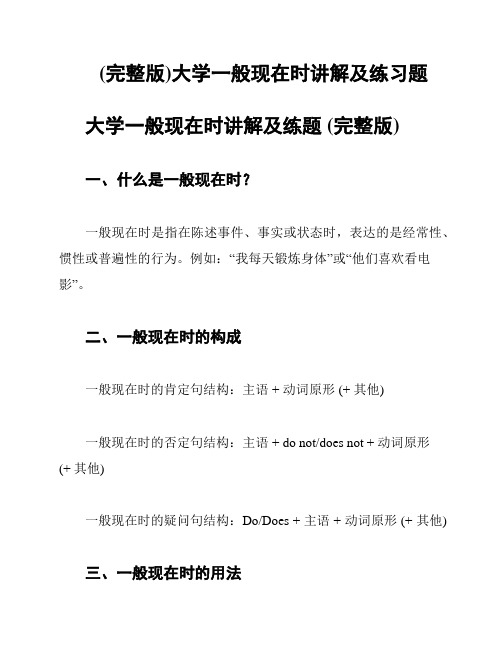
(完整版)大学一般现在时讲解及练习题大学一般现在时讲解及练题 (完整版)一、什么是一般现在时?一般现在时是指在陈述事件、事实或状态时,表达的是经常性、惯性或普遍性的行为。
例如:“我每天锻炼身体”或“他们喜欢看电影”。
二、一般现在时的构成一般现在时的肯定句结构:主语 + 动词原形 (+ 其他)一般现在时的否定句结构:主语 + do not/does not + 动词原形(+ 其他)一般现在时的疑问句结构:Do/Does + 主语 + 动词原形 (+ 其他)三、一般现在时的用法1. 表示客观事实、真理或普遍现象,常常与表示频率的副词一起使用。
例如:“水烧开时会冒泡”。
2. 表示经常性或惯性的行为。
例如:“我每天都喝咖啡”。
3. 表示现阶段的情况或状态。
例如:“我现在住在中国”。
4. 在叙述历史事件或小说情节时,使用一般现在时可以增加紧迫感和现场感。
例如:“他打开门,走进了房间”。
四、一般现在时的练题1. 填入适当的动词形式:- She ____(have) two cats.- They ____(go) to school every day.- My father ____(work) as a doctor.2. 句子改为否定句:- I eat breakfast every morning.- She likes to read books.- We play tennis on weekends.3. 根据题意回答问题:- When do you usually go to bed? - Does he watch TV every evening? - How often does she go shopping?4. 将下列句子改为一般疑问句:- You live in London.- They play football in the park.- She enjoys dancing.五、答案1. 填入适当的动词形式:- She has two cats.has two cats.- They go to school every day.go to school every day. - My father works as a doctor.works as a doctor.2. 句子改为否定句:- I do not eat breakfast every morning.- She does not like to read books.- We do not play tennis on weekends.3. 根据题意回答问题:- I usually go to bed at 11 PM.- Yes, he watches TV every evening.- She goes shopping once a week.4. 将下列句子改为一般疑问句:- Do you live in London?- Do they play football in the park?- Does she enjoy dancing.希望以上内容对你理解和练一般现在时有所帮助!如有任何问题,请随时向我提问。
一般现在时知识点详解及练习(145题 含解析 页)初中英语专题复习
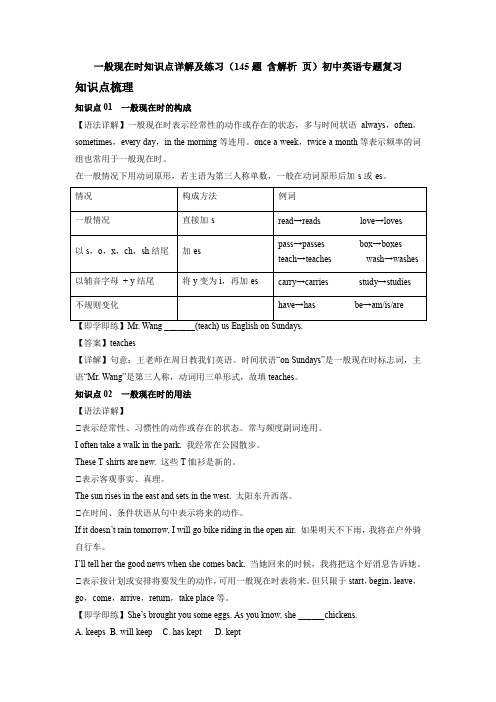
一般现在时知识点详解及练习(145题含解析页)初中英语专题复习知识点梳理知识点01 一般现在时的构成【语法详解】一般现在时表示经常性的动作或存在的状态,多与时间状语always,often,sometimes,every day,in the morning等连用。
once a week,twice a month等表示频率的词组也常用于一般现在时。
在一般情况下用动词原形,若主语为第三人称单数,一般在动词原形后加-s或-es。
【答案】teaches【详解】句意:王老师在周日教我们英语。
时间状语“on Sundays”是一般现在时标志词,主语“Mr. Wang”是第三人称,动词用三单形式,故填teaches。
知识点02 一般现在时的用法【语法详解】①表示经常性、习惯性的动作或存在的状态。
常与频度副词连用。
I often take a walk in the park. 我经常在公园散步。
These T-shirts are new. 这些T恤衫是新的。
①表示客观事实、真理。
The sun rises in the east and sets in the west. 太阳东升西落。
①在时间、条件状语从句中表示将来的动作。
If it doesn’t rain tomorrow, I will go bike riding in the open air. 如果明天不下雨,我将在户外骑自行车。
I’ll tell her the good news when she comes back. 当她回来的时候,我将把这个好消息告诉她。
①表示按计划或安排将要发生的动作,可用一般现在时表将来。
但只限于start,begin,leave,go,come,arrive,return,take place等。
【即学即练】She’s brought you some eggs. As you know, she ______chickens.A. keepsB. will keepC. has keptD. kept【详解】句意:她给你带了些鸡蛋。
英语语法速成一般现在时精讲精练

英语语法速成一般现在时精讲精练一般现在时是英语中最基本的时态之一,用来表示经常性的、重复性的动作,或者客观事实和普遍真理。
在本篇文章中,我们将详细介绍一般现在时的用法,并提供一些相关的练习。
一、第一人称单数和第三人称单数谓语动词的构成在一般现在时中,第一人称单数(I)和第三人称单数(he/she/it)的谓语动词构成方式有所不同。
1. 对于第一人称单数,即I,谓语动词直接采用原形,不需要做任何改变。
例如:I play tennis every Sunday.(我每个星期天打网球。
)2. 对于第三人称单数,即he/she/it,谓语动词在后面加上-s或-es。
具体的变化规则如下:a. 一般情况下,在谓语动词后面加上-s。
例如:She studies English every day.(她每天学英语。
)b. 如果谓语动词以字母s、x、o、ch、sh结尾,那么在后面加上-es。
例如:He watches movies on weekends.(他周末看电影。
)c. 如果谓语动词以辅音字母+y结尾,那么将y改为i,再加上-es。
例如:My dog barks loudly at night.(我的狗晚上叫得很大声。
)二、一般现在时的用法1.表示经常性或习惯性的动作:I often go jogging in the morning.(我经常早上慢跑。
)2.表示客观事实和普遍真理:The sun rises in the east.(太阳从东方升起。
)3.表示现状、感觉或状态:I feel tired after work.(工作后我感到疲劳。
)4.表示固定时间表中的动作:The train always arrives on time.(火车总是准时到达。
)三、一般现在时的练习现在我们来进行一些练习,以巩固对一般现在时的理解。
1. 填入适当的动词形式(第三人称单数):a. He __________ (watch) TV every day.b. The cat __________ (meow) at night.c. Mary __________ (teach) English at a school.d. The sun __________ (shine) in the sky.2. 根据括号中的提示,改写句子:a. She drinks milk every morning.(改为否定句)She ________ ________ milk every morning.b. They play basketball in the park.(改为疑问句)________ they ________ basketball in the park?c. My brother goes swimming on weekends.(改为一般疑问句)________ your brother ________ swimming on weekends?d. We have English class on Monday.(改为否定句)We ________ ________ English class on Monday.(答案)1. a. watches b. meows c. teaches d. shines2. a. doesn't drink b. Do; play c. Does; go d. don't have通过以上练习,希望能够帮助你更好地理解和使用一般现在时。
一般现在时的结构和用法
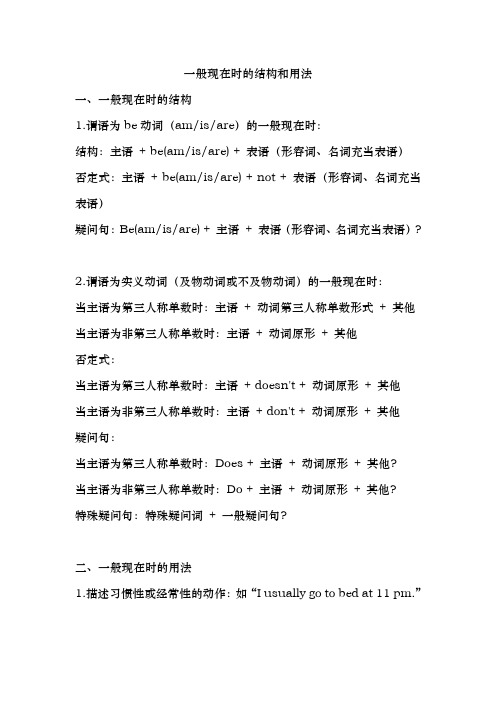
一般现在时的结构和用法
一、一般现在时的结构
1.谓语为be动词(am/is/are)的一般现在时:
结构:主语+ be(am/is/are) + 表语(形容词、名词充当表语)
否定式:主语+ be(am/is/are) + not + 表语(形容词、名词充当表语)
疑问句:Be(am/is/are) + 主语+ 表语(形容词、名词充当表语)?
2.谓语为实义动词(及物动词或不及物动词)的一般现在时:
当主语为第三人称单数时:主语+ 动词第三人称单数形式+ 其他当主语为非第三人称单数时:主语+ 动词原形+ 其他
否定式:
当主语为第三人称单数时:主语+ doesn't + 动词原形+ 其他
当主语为非第三人称单数时:主语+ don't + 动词原形+ 其他
疑问句:
当主语为第三人称单数时:Does + 主语+ 动词原形+ 其他?
当主语为非第三人称单数时:Do + 主语+ 动词原形+ 其他?
特殊疑问句:特殊疑问词+ 一般疑问句?
二、一般现在时的用法
1.描述习惯性或经常性的动作:如“I usually go to bed at 11 pm.”
2.表达客观事实或普遍真理:如“The sun rises in the east.”
3.描述时间表或日程安排:如“The train leaves at 8 am.”
4.在新闻报道或科技文章中描述当前状况:如“The company is developing a new product.”。
一般现在时精讲精练
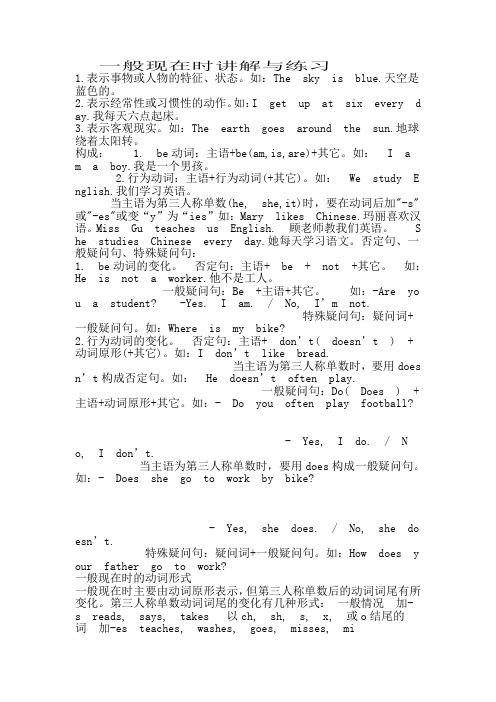
一般现在时讲解与练习1.表示事物或人物的特征、状态。
如:The sky is blue.天空是蓝色的。
2.表示经常性或习惯性的动作。
如:I get up at six every d ay.我每天六点起床。
3.表示客观现实。
如:The earth goes around the sun.地球绕着太阳转。
构成: 1. be动词:主语+be(am,is,are)+其它。
如:I am a boy.我是一个男孩。
2.行为动词:主语+行为动词(+其它)。
如:We study E nglish.我们学习英语。
当主语为第三人称单数(he, she,it)时,要在动词后加"-s"或"-es"或变“y”为“ies”如:Mary likes Chinese.玛丽喜欢汉语。
Miss Gu teaches us English. 顾老师教我们英语。
S he studies Chinese every day.她每天学习语文。
否定句、一般疑问句、特殊疑问句:1. be动词的变化。
否定句:主语+ be + not +其它。
如:He is not a worker.他不是工人。
一般疑问句:Be +主语+其它。
如:-Are yo u a student? -Yes. I am. / No, I’m not.特殊疑问句:疑问词+一般疑问句。
如:Where is my bike?2.行为动词的变化。
否定句:主语+ don’t( doesn’t ) +动词原形(+其它)。
如:I don’t like bread.当主语为第三人称单数时,要用does n’t构成否定句。
如:He doesn’t often play.一般疑问句:Do( Does ) +主语+动词原形+其它。
如:- Do you often play football?- Yes, I do. / N o, I don’t.当主语为第三人称单数时,要用does构成一般疑问句。
一般现在时用法精讲精练
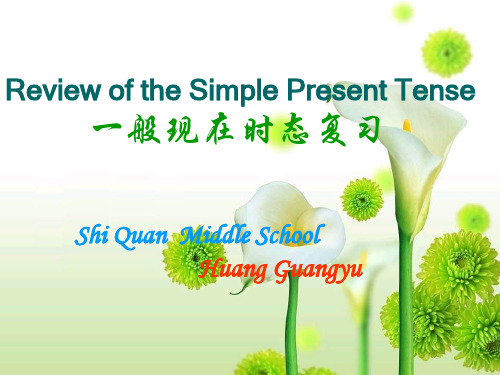
Does+主语(he/she/it)+动词原形+其他? e.g. Does he stay at home on Saturdays? Does Lucy have sports every day?
2.表经常或习惯性的动作: e.g. I get up at 6:30 every day. He reads English every morning.
3.表主语具备的性格和能力等: e.g. She likes noodles. They speak French.
4.普遍真理和自然规律: e.g. Two plus four is six. The moon goes around the earth.
否定句:主语(I/We/You/They)+do+ not+动词原形+其他 e.g. I don’t stay at home on Saturdays. They don’t have sports every day. 主语(He/She/It)+does +not+动词原形+其他 e.g. He doesn’t stay at home on Saturdays. Lucy doesn’t have sports every day.
Review of the Simple Present Tense
一般现在时态复习
Shi Quan Middle School Huang Guangyu
完整word版-初中一般现在时用法及练习
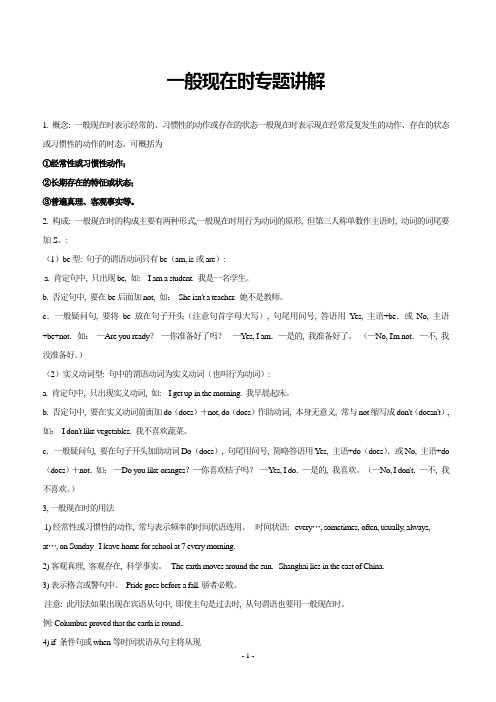
一般现在时专题讲解1. 概念: 一般现在时表示经常的、习惯性的动作或存在的状态一般现在时表示现在经常反复发生的动作、存在的状态或习惯性的动作的时态。
可概括为①经常性或习惯性动作;②长期存在的特征或状态;③普遍真理、客观事实等。
2. 构成: 一般现在时的构成主要有两种形式,一般现在时用行为动词的原形, 但第三人称单数作主语时, 动词的词尾要加-S。
:(1)be型: 句子的谓语动词只有be(am, is或are):a. 肯定句中, 只出现be, 如: I am a student. 我是一名学生。
b. 否定句中, 要在be后面加not, 如: She isn't a teacher. 她不是教师。
c.一般疑问句, 要将be放在句子开头(注意句首字母大写), 句尾用问号, 答语用Y es, 主语+be.或No, 主语+be+not.如:—Are you ready?—你准备好了吗?—Y es, I am.—是的, 我准备好了。
(—No, I'm not.—不, 我没准备好。
)(2)实义动词型: 句中的谓语动词为实义动词(也叫行为动词):a. 肯定句中, 只出现实义动词, 如: I get up in the morning. 我早晨起床。
b. 否定句中, 要在实义动词前面加do(does)+not, do(does)作助动词, 本身无意义, 常与not缩写成don't(doesn't), 如: I don't like vegetables. 我不喜欢蔬菜。
c.一般疑问句, 要在句子开头加助动词Do(does), 句尾用问号, 简略答语用Y es, 主语+do(does).或No, 主语+do (does)+not.如:—Do you like oranges?—你喜欢桔子吗?—Y es, I do.—是的, 我喜欢。
(—No, I don't.—不, 我不喜欢。
(完整版)一般现在时态讲解及练习(精简版,错题版)

一般现在时态一、一般现在时的用法1) 表示经常性、习惯性的动作或存在的状态。
通常与副词sometimes, often, usually, always, everyday (year, month ), once (twice, three times) a day, 等等频率副词(时间状语)连用。
e.g. They usually go to school by bike.I take the medicine three times a day. 实义动词表示“动作”She helps her mother once a week.Mary’s father is a policeman.There are 50 students in my class. Be动词表示“状态”He is very busy now.be 、do不能放一起,如果非要放一起,do后要加ing, 变成现在进行时。
2) 表示主语的特征、性格、爱好等。
e.g. I work hard.I like watching TV.3) 表示客观真理e.g. There are seven days in a week.The moon moves round the earth.The sun rises in the east and sets in the west every day.Tomorrow is Tuesday.二、一般现在时的句子转换:三、一般现在时的结构:“主语+谓语+其它”,有时为了起强调作用,时间状语也可提前.三单变化:1)多数在动词后+s :play — plays like — likes ask---asks work---works get---gets stay---stays 2)以字母s, x, ch, sh或o结尾的动词,+-es:watch---watches wish---wishes fix---fixes do---does go---goes pass---passes 3)以“辅音字母加- y”结尾的动词,要先变y为i+-es.try---tries study---studies cry---cries fly---flies不规则变化:be---- is are have----has做题时常见错误如下:1)、be动词与行为动词同时出现在句子中例:We are plant (plant) the trees in spring.答案:plant2)、单三人称形式易出错例:1 He plaies (play) football very well.2 Danny gos (go) to school at 7:10.答案:1 plays 2 goes解析:1以辅音字母加y结尾的动词变单三人称形式才能把y换成i再加es;2与名词变复数不同,变单三人称形式以o结尾的词要加es.3)、在句式变换时易出错例:1 Does Jenny has (has) a good friend?2 Brian doesn’t lives (not live) in China.答案:1 Does have 2 doesn’t live解析:口诀:“见助动,用原形”。
小学生一般现在时讲解及练习题
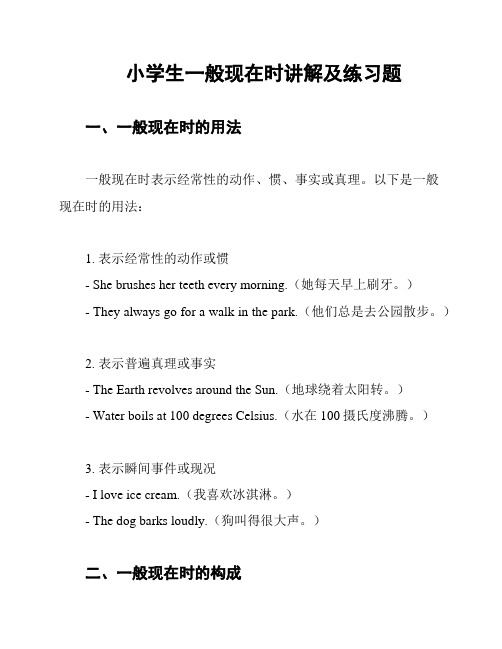
小学生一般现在时讲解及练习题一、一般现在时的用法一般现在时表示经常性的动作、惯、事实或真理。
以下是一般现在时的用法:1. 表示经常性的动作或惯- She brushes her teeth every morning.(她每天早上刷牙。
)- They always go for a walk in the park.(他们总是去公园散步。
)2. 表示普遍真理或事实- The Earth revolves around the Sun.(地球绕着太阳转。
)- Water boils at 100 degrees Celsius.(水在100摄氏度沸腾。
)3. 表示瞬间事件或现况- I love ice cream.(我喜欢冰淇淋。
)- The dog barks loudly.(狗叫得很大声。
)二、一般现在时的构成在一般现在时中,动词的变化相对简单。
1. 对于第三人称单数(He/She/It),动词要加-s或-es。
- He walks to school every day.(他每天走路去学校。
)- She eats an apple.(她吃一个苹果。
)- It runs fast.(它跑得很快。
)2. 对于其他人称(I/You/We/They),动词不变。
- I play soccer on weekends.(我周末踢足球。
)- You read books every night.(你每晚读书。
)- We go swimming in summer.(我们夏天去游泳。
)- They watch movies together.(他们一起看电影。
)三、练题请根据句意填入正确的动词形式。
1. My mother __________ (cook) dinner for us every evening.2. Tom and Lisa __________ (play) tennis on Saturdays.3. The sun __________ (rise) in the east.4. We __________ (study) English at school.5. Dogs __________ (bark) when they see strangers.1. cooks2. play3. rises4. study5. bark希望以上讲解和练习题对你有帮助!。
(完整版)一般现在时讲解+练习
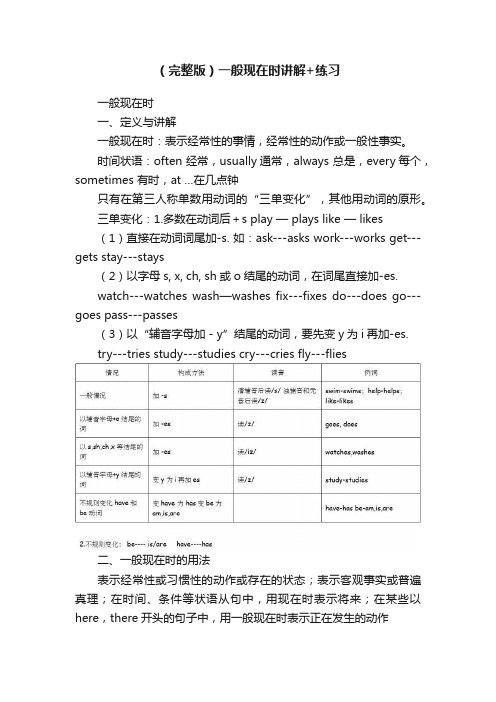
(完整版)一般现在时讲解+练习一般现在时一、定义与讲解一般现在时:表示经常性的事情,经常性的动作或一般性事实。
时间状语:often 经常,usually通常,always 总是,every每个,sometimes 有时,at …在几点钟只有在第三人称单数用动词的“三单变化”,其他用动词的原形。
三单变化:1.多数在动词后+s play — plays like — likes(1)直接在动词词尾加-s. 如:ask---asks work---works get---gets stay---stays(2)以字母s, x, ch, sh或o结尾的动词,在词尾直接加-es.watch---watches wash—washes fix---fixes do---does go---goes pass---passes(3)以“辅音字母加 - y”结尾的动词,要先变y为i再加-es.try---tries study---studies cry---cries fly---flies二、一般现在时的用法表示经常性或习惯性的动作或存在的状态;表示客观事实或普遍真理;在时间、条件等状语从句中,用现在时表示将来;在某些以here,there开头的句子中,用一般现在时表示正在发生的动作当主语是第三人称单数时:1、动词变相应的第三人称单数形式2、肯定句主语+动词s+其它3、否定句主语+doesn't+动词原形+其它4、一般疑问句Does+主语+动词原形+其它5、肯定回答 Yes,主语+does6、否定回答 No,主语+doesn't7、特殊疑问句特殊疑问词+一般疑问句当主语不是第三人称单数时:1、肯定句主语+动词原形+其它2、否定句主语+don't+动词原形+其它3、一般疑问句 Do+主语+动词原形+其它4、要注意,句式结构错则全都错。
5、谓语动词的形式:do/does一般现在时练习一、用所给词的正确形式填空1. We often ___________ (play) on the playground.2. He _________ (get) up at six o’clock.3. __________you _________ (brush) your teeth every morning.4. What____ (do) he usually _____ (do) after school?5. Danny _______ (study) English, Chinese, Math, Science and Art at school.6. Mike sometimes __________ (go) to the park with his sister.7. At eight at night, she ________ (watch) TV with his parents.8. ________ Mike________ (read) English every day?9. How many lessons ______your classmate____ (have) on Monday?10. What time ____his mother_________ (do) the housework?11. He often ______ (have) dinner at home. 12. Daniel and Tommy___ (be) in Class One. 13. We____ (not watch) TV on Monday. 14. Nick _____(not go) to the zoo on Sunday.15. They______ (like) the World Cup? 16. What ____they often ____ (do) on Saturdays17. Your parents________ (read) newspapers every day?18. The girl______ (teach) us English on Sundays.19. She and I _______ (take) a walk together every evening.20. There_______ (be) some water in the bottle. 21. Mike ______ (like) cooking.22. They_______ (have) the same hobby. 23. My aunt______ (look) after her baby carefully.24. You always____ (do) your homework well. 25. I_____ (be) ill. I’m sta ying in bed.26. She_____ (go) to school from Monday to Friday. 27. Liu Tao _____ (do) not like PE.28. The child often______ (watch) TV in the evening.29. Su Hai and Su Yang ______(have) eight lessons this term.30. -What day ______(be) it today? -It’s Saturday.31. Don’t make a noise. Grandpa __________ (sleep).32. Tom’s family__________ (watch) TV.33. It ________ (take) me two hours to finish my homework last night.34. What ______ your mother _______ (do) every evening? She_______ (wash) clothes.35. _______ it ______ (rain) every day?36. What _______ (do) you _______ on Sundays? We ________ (play) football.37. There ________ (be) a football match on TV every morning.38. They often ________ (visit) the Great Wall.39. Who _______ (dance) the best in your class?40. He _____________ (not come).41. The earth __________ (move) round the sun.42 She ________ (buy) a sweater.43. Mr. Wang often______ (go) to Shanghai.二、改句子1. Do you often play football after school? (肯定回答)_______________________________2. I have many books. (改为否定句)_______________________________3. Gao Shan's sister likes playing table tennis (改为否定句)________________________4. She lives in a small town near New York. (改为一般疑问句)________________________5. I watch TV every day. (改为一般疑问句)________________________6. David has a goal. (改为一般疑问句)________________________7. We have four lessons.(否定句)________________________8. Nancy doesn’t run fast (肯定句)________________________9. My dog runs fast. (一般疑问句) ________________________(把10—14小题变否定句,一般疑问句和划线提问)10. Mike has two letters for him. ________________________11. I usually play football on Friday afternoon.________________________12. Su Yang usually washes some clothes on Saturday. ________________________13. Mingming usually waters the flowers every day. ________________________14. Tom does his homework at home. ________________________三、写出下列动词的第三人称单数形式:1. wash_________ match _______ guess______ study______finish_________ go________ snow______ carry_________2. stop______ see________ drive ________let_______ carry______keep_____ join______ find_______ think________ teach______ catch______3. stay_______ begin______ forget_______ lie________ die _______run_______ prefer______ give________ ring_______ dance______ hope_______四、单项选择:1. There _____ an English film at the cinema now.A. will haveB. is going to haveC. is going to beD. is2. The picture _______ nice. A. looks B. is looked C. look D. is looking3. She ______ down and soon falls asleep. A. live B. lain C. laidD. sits4. They _____ the office in time very morning. A. reach to B. arrived C. went D. get to5. We shall go to Shanghai on business before you _____ back next week.A. will comeB. cameC. would comeD. come6. The plane ______ over there. A. is B. are C.am D. was7. I see her ____ the room this morning. A. to enter B. enteredC. enterD. enters8. The teacher ________us to come to school on time. A. ask B. asking C. asks D. asked9. John always ______ others. A. help B. helping C. helps D. to help10. He ______for eight hours every day. A. working B. to workC. worksD. worked11. You’d better ______ at home and ______ your homework.A. to stay, doB. stay, doC. to stay, to doD. stay, to do12. He sits down and ______ a rest. A. having B. have C. to haveD. has13. Uncle Wang never ______ a cake. A. make B. to make C. making D. makes五、请写出下列句子1.他每天早上七点乘公交车去上学。
一般现在时态精讲精练

初中英语一般现在时态一、定义与讲解一般现在时表示经常或习惯性的动作或一般性事实,也可表示现在的状态或主语具备的性格和能力。
通常与every day(每天),频度副词always(总是),usually (通常),often(经常)sometimes(有时)等时间状语连用。
频度副词在句中通常放在行为动词之前,系动词、助动词之后。
例:(1)表示事物或人物的特征、状态。
The sky is blue.天空是蓝色的。
Mary’s father is a n English teacher.玛丽的爸爸是一名英语老师。
(2)表示经常性或习惯性的动作。
I get up at six every day.我每天六点起床。
She plays sports every day. 她每天都做运动。
(3)表示客观现实。
The table has four legs.桌子有四条腿。
There are 50 students in my class. 我们班有50个学生。
(4)表示客观真理,科学原理,自然现象,等客观事实或格言谚语等。
The sun rises in the east every day.太阳每天从东方升起。
The earth goes around the sun.地球绕着太阳转。
(5)表示平日的喜好。
I like bananas. We don’t like vegetables.He likes ice cream. She doesn’t like strawberries.(6)在复合句中,当主句是一般将来时,时间或条件状语从句的谓语动词只能用一般现在时来表示将来要发生的动作。
I'll tell him the news when he comes back.他回来时,我将告诉他这个消息。
如果明天不下雨,我们将去公园。
二.只有主语是单数第三人称时用动词的“单三形式”,其他人称用动词原形。
★动词单三形式的变化规则:1.(1)多数直接在动词词尾加-s.play — plays like — likes ask---askswork---works get---gets call---calls(2)以字母s, x, ch, sh或o结尾的动词,在词尾直接加-es.watch---watches wish---wishes do---does go---goes (3)以“辅音字母加y”结尾的动词,要先变y为i再加-es.注意一定是辅音字母加y才变,若是元音字母加y,则直接加-s。
2024年初中英语语法重点一般现在时的用法和练习详解

一般现在时(Simple Present Tense)表示经常性或习惯性的动作、客观事实、普遍真理等,下面详细介绍一般现在时的用法和练习。
一、肯定句的用法:1. 第三人称单数主语在一般现在时的肯定句中需要加s或es。
例如:- She studies English every day. (她每天学习英语。
)- He eats breakfast at 8 o'clock. (他八点吃早饭。
)2.一般现在时的肯定句中可以使用频度副词,表示动作发生的频率。
例如:- I often go swimming on weekends. (我经常在周末去游泳。
)- They always arrive early for class. (他们上课总是很早到达。
)3.一般现在时的肯定句中可以使用时间状语,表示动作发生的时间。
例如:- We usually have dinner at 7 o'clock. (我们通常七点吃晚饭。
) - The bus leaves the station every half an hour. (这辆公交车每隔半小时离开车站。
)二、否定句的用法:1. 将助动词do或does放在句首,再加上not构成否定句。
- She does not like coffee. (她不喜欢咖啡。
)- They do not play basketball on Sundays. (他们不在星期天打篮球。
)2. 第三人称单数主语在否定句中也需要加s或es。
例如:- He does not understand the question. (他不明白这个问题。
) - The bird does not sing in the night. (这只鸟不在夜晚唱歌。
)3.否定句中的频度副词和时间状语的位置也是在助动词后面。
例如:- I do not often watch TV. (我不经常看电视。
一般现在时用法精讲精练

否定句构成方法
要点一
主语 + do not/does not + 动词 原形…
在动词前加do not(缩写为don't)或does not(缩写为 doesn't)。
要点二
主语 + am/is/are not + 其他成 分
当句子中含有be动词时,在be动词后加not。
它也可以用来描述客观事实、 科学原理、普遍真理等不受时 间限制的情况。
在简单句和复合句中,一般现 在时可以作为主句或从句的时 态。
时态标志词
频度副词
always, usually, often, sometimes等。
表示状态的动词
be动词(am/is/are),have/has 等。
其他标志词
every day, on Sundays, at night 等。
确定主语
根据句子语境确定主语的人称和数。
选择正确形式
根据主语和时态选择正确的动词形式。
判断时态
根据时间状语或上下文语境判断时态。
阅读理解中运用一般现在时
理解文章大意
定位关键信息
分析句子结构
快速浏览全文,了解文 章主题和背景。
根据问题中的关键词定 位到文章中的相关信息。
分析句子中的主语、谓 语和其他成分,确定时
疑问句转换技巧
1 2 3
将be动词或助动词提前至句首
将肯定句中的be动词(am/is/are)或助动词 (do/does)提前至句首,其他部分保持不变。
特殊疑问句使用疑问词引导
根据所需询问的内容选择合适的疑问词(如 what、where、who等),并将其放在句首引 导特殊疑问句。
一般现在时的正确使用与实例演练

一般现在时的正确使用与实例演练一般现在时是英语中最常用的时态之一,用来描述经常性的行为、习惯、科学事实、客观真理以及永恒的真理等。
在本文中,将介绍一般现在时的正确使用,并提供一些实例演练。
(正文)一、习惯和经常性的行为一般现在时可以用来描述习惯或经常性的行为。
下面是一些例句:1. I drink coffee every morning.(我每天早上喝咖啡。
)2. She plays tennis three times a week.(她每周打三次网球。
)3. They always go for a walk after dinner.(他们晚饭后经常散步。
)二、科学事实一般现在时还可以用来表达科学事实。
例如:1. The sun rises in the east.(太阳从东方升起。
)2. Water boils at 100 degrees Celsius.(水在100摄氏度时沸腾。
)3. Plants need sunlight to grow.(植物需要阳光来生长。
)三、客观真理和永恒的真理一般现在时也可以用来表达客观真理和永恒的真理。
例如:1. Cats are mammals.(猫是哺乳动物。
)2. The Earth revolves around the sun.(地球绕太阳运转。
)3. Honesty is the best policy.(诚实是最好的策略。
)练习:根据下面的句子,将动词变为一般现在时。
1. They (play) basketball every weekend.2. My mother (work) as a teacher.3. We (visit) our grandparents twice a year.4. The Earth (rotate) around the sun.5. Water (boil) at 100 degrees Celsius.6. Cats (like) to chase mice.答案:1. They play basketball every weekend.2. My mother works as a teacher.3. We visit our grandparents twice a year.4. The Earth rotates around the sun.5. Water boils at 100 degrees Celsius.6. Cats like to chase mice.总结:一般现在时的正确使用需要注意以下几点:1. 描述习惯和经常性的行为时,使用动词原形。
一般现在时语法点精讲与典型例题
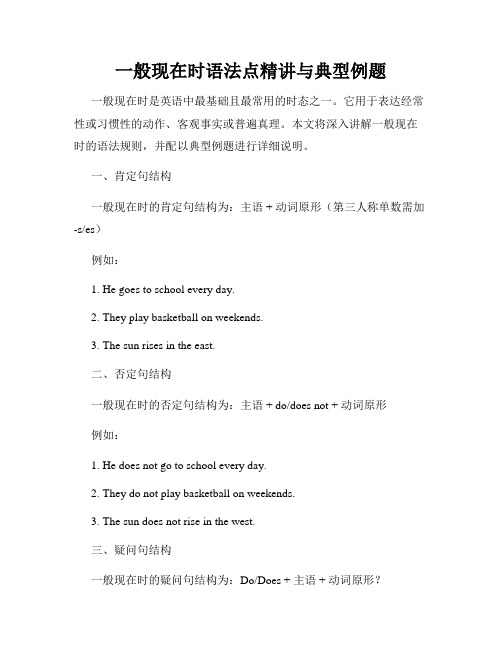
一般现在时语法点精讲与典型例题一般现在时是英语中最基础且最常用的时态之一。
它用于表达经常性或习惯性的动作、客观事实或普遍真理。
本文将深入讲解一般现在时的语法规则,并配以典型例题进行详细说明。
一、肯定句结构一般现在时的肯定句结构为:主语 + 动词原形(第三人称单数需加-s/es)例如:1. He goes to school every day.2. They play basketball on weekends.3. The sun rises in the east.二、否定句结构一般现在时的否定句结构为:主语 + do/does not + 动词原形例如:1. He does not go to school every day.2. They do not play basketball on weekends.3. The sun does not rise in the west.三、疑问句结构一般现在时的疑问句结构为:Do/Does + 主语 + 动词原形?例如:1. Does he go to school every day?2. Do they play basketball on weekends?3. Does the sun rise in the west?四、第三人称单数动词变化规则在一般现在时中,第三人称单数动词需要加上-s或-es。
具体规则如下:1. 一般的规则是在动词原形后加上-s例如:play → plays, walk → walks2. 如果动词以s, x, ch, sh, o结尾,则加上-es例如:watch → watches, fix → fixes, teach → teaches, go → g oes3. 如果动词以辅音字母+y结尾,则将y改为i,再加上-es例如:study → studies, fly → flies五、一般现在时的用法1. 经常性或习惯性动作:I usually wake up at 7 o'clock in the morning.She brushes her teeth before going to bed.2. 客观事实或普遍真理:Water boils at 100 degrees Celsius.The earth revolves around the sun.3. 科学定律或规律:Light travels faster than sound.Plants need sunlight to grow.典型例题:1. _______ basketball on weekends?A. Do he playB. Does he playsC. Does he playD. Do he plays正确答案:C2. My sister _______ to the library every day.A. goesB. goC. is goingD. went正确答案:A3. The moon _______ around the earth.A. revolvesB. revolveC. is revolvingD. has revolved正确答案:A4. They _______ English in the evening.A. studiesB. studyC. is studyingD. are studied正确答案:B5. _______ you often _______ late for school?A. Do, areB. Are, doC. Do, beD. Are, be正确答案:C总结:一般现在时是英语中最基础的时态之一,用于表达经常性或习惯性的动作、客观事实或普遍真理。
一般现在时用法全面解析与练习
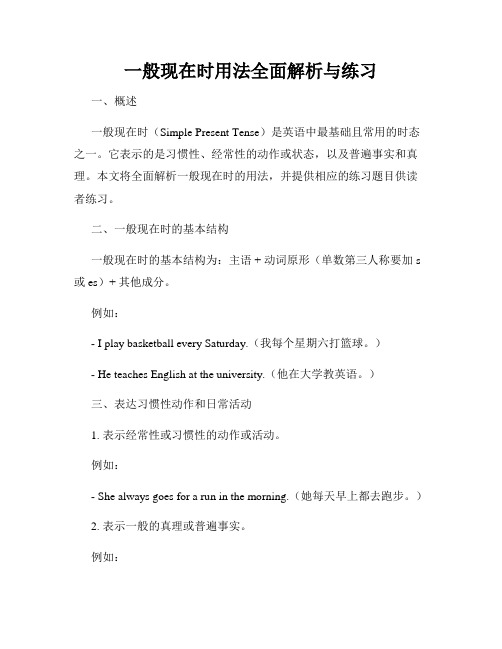
一般现在时用法全面解析与练习一、概述一般现在时(Simple Present Tense)是英语中最基础且常用的时态之一。
它表示的是习惯性、经常性的动作或状态,以及普遍事实和真理。
本文将全面解析一般现在时的用法,并提供相应的练习题目供读者练习。
二、一般现在时的基本结构一般现在时的基本结构为:主语 + 动词原形(单数第三人称要加s 或es)+ 其他成分。
例如:- I play basketball every Saturday.(我每个星期六打篮球。
)- He teaches English at the university.(他在大学教英语。
)三、表达习惯性动作和日常活动1. 表示经常性或习惯性的动作或活动。
例如:- She always goes for a run in the morning.(她每天早上都去跑步。
)2. 表示一般的真理或普遍事实。
例如:- The sun rises in the east.(太阳从东方升起。
)- Water boils at 100 degrees Celsius.(水在摄氏100度时煮沸。
)练习题:1. Mark ________ (play/plays) soccer every Sunday.2. Birds ________ (fly/flies) in the sky.3. My mom ________ (cook/cooks) dinner for us every evening.四、表达当前状态或特征一般现在时也可用来描述当前的状态或特征。
这些状态通常是长期持续的,而非临时的情况。
例如:- She looks tired today.(她今天看起来很累。
)- I live in New York City.(我住在纽约市。
)练习题:1. The flowers ________ (smell/smells) beautiful.2. My brother ________ (study/studies) medicine at university.3. We ________ (live/lives) in a big house.五、使用时间状语为了更准确地表达一般现在时,我们可以使用时间状语来指定动作发生的时间。
一般现在时态精讲精练

一般现在时态精讲精练一.定义表示现在经常反复发生的动作、存有的状态或习惯性的动作的时态。
二.用法1.表示现在的状态:e.g. He is twelve.She is at work.e.g. I get up at 6:30 every day.He reads English every morning.3.表主语具备的性格和水平等:e.g. She likes noodles.They speak French.4.表示不受时间限制的普遍真理和自然规律:e.g. Two and four is six.The moon goes around the earth三.与一般现在时连用的时间状语常见的有:1.every day/year/month/week/morning/afternoon/evening2、频率副词always(总是),usually(经常),often(时常),sometimes(有时),never(从未,绝不),seldom (很少,不常),rarely(很少的,难得)3.次数一次once 两次twice 三次three times 一周两次twice a week 每周四次four times a week 每周六on Saturdays 每周日on Sundays四、一般现在时的构成1、系动词be的一般现在时肯定句:主语+ be + 其他。
否定句:主语+ be + not + 其他一般疑问句:be + 主语+ 其它部分?/肯定回答:Yes,主语+be / 否定回答:No,主语+be+not特殊疑问句:特殊疑问词+ be + 主语+ 其他?2、情态动词的一般现在时肯定句:主语+ 情态动词+ 动词原形+其他否定句:主语+ 情态动词+ not + 动词原形+ 其他一般疑问句:情态动词+ 主语+动词原形+ 其他?肯定回答:Yes,主语+情态动词/ 否定回答:No,主语+情态动词+ not特殊疑问句:特殊疑问词+ be + 主语+ 其他?3、实义(行为)动词的一般现在时(1)当主语是一二人称及复数时肯定句:主语+ 动词原形+ 其他。
一般现在时精讲精练

语法:一般现在时:到了让人头疼的语法了,没关系,老师来帮你!一.经常习惯动作和真理是一般现在时的定义。
常与always, usually , often , sometimes ,every day,on Mondays, on weekends等连用。
二. 一般现在时的构成及变化:(分be动词及行为动词两种)1.be动词的变化。
肯定句:主语+be(am,is,are)+其它。
如:I am a boy.我是一个男孩。
否定句:主语+ be + not +其它。
如:He is not a worker.他不是工人。
一般疑问句:Be +主语+其它? 如:-Are you a student? -Yes. I am. / No, I'm not.特殊疑问句:疑问词+一般疑问句?如:Where is my bike?2. 行为动词的变化。
(按助动词分do 和does两种)l、当主语为第一,二人称及复数时,助动词为肯定句:主语+动词原形(+其它)。
如:We often play basketball after school.否定句:主语+ don't+动词原形(+其它)。
如:We don’t play basketball after school.一般疑问句:Do +主语+动词原形+其它? 肯定回答:Yes, 主语+do. 否定回答:No, 主语+don’t.如:Do you often play basketball after school l? Yes, we do. / No, we don't.特殊疑问句:疑问词+以do开头的一般疑问句?如:What do you often do after school ?2、当主语为第三人称单数时,助动词为肯定句:主语+动词三单式(+其它)。
如:He swims well.否定句:主语+ doesn’t+动词原形(+其它)如:He doesn’t swim well..一般疑问句:Does +主语+动词原形+其它。
初中一般现在时精讲精练

初中一般现在时精讲精练一般现在时的定义一般现在时是用来表示当前的状态、惯、经常性的动作或普遍真理的时态。
在一般现在时中,动词只需用原形。
一般现在时的用法1. 表示普遍真理或客观事实例如:- 太阳升起在东方。
- 地球绕着太阳转。
- 水沸腾的温度是100度。
2. 表示经常性的动作或惯例如:- 我每天早晨6点起床。
- 我妈妈每周六做家务。
- 我们每年去旅行一次。
3. 表示当前的状态或情况例如:- 我现在住在北京。
- 他们正在上课。
- 我们的班级有40个学生。
一般现在时的变化- 第三人称单数(he/she/it)的动词要加-s或-es。
- 动词末尾是字母s、x、sh、ch或o时,要加-es。
- 动词末尾是辅音字母+y时,要把y改为i再加-es。
- 其他情况下,动词保持原形。
一般现在时的练选择正确的动词形式填空:1. The sun __________ in the east.a) riseb) risesc) rising2. My father ________ football every weekend.a) playb) playsc) played3. They ________ a big house in the city.a) haveb) hasc) had4. I ________ English every day.a) studyb) studiesc) studying完成下列句子:1. She ____________ (live) in London.2. We usually _____________ (eat) dinner at 7 p.m.3. The teacher ____________ (teach) us math.4. They ____________ (watch) TV every night.总结初中一般现在时用来表示当前的状态、惯、经常性动作或普遍真理。
- 1、下载文档前请自行甄别文档内容的完整性,平台不提供额外的编辑、内容补充、找答案等附加服务。
- 2、"仅部分预览"的文档,不可在线预览部分如存在完整性等问题,可反馈申请退款(可完整预览的文档不适用该条件!)。
- 3、如文档侵犯您的权益,请联系客服反馈,我们会尽快为您处理(人工客服工作时间:9:00-18:30)。
特殊疑问句:疑问词+ do/does+主语+动词原形+其他?
e.g. What do you want? What does she want? What time do you have lunch? What time does she have lunch? What do you do? What does she do? How do you spell it? How does he spell it? How do you like Chinese food? How does he like Chinese food? How many tomatoes do you want? How many tomatoes does he want? How do you go to work? How does your father go to work?
Review of the Simple Present Tense
一般现在时态复习
Shi Quan Middle School Huang Guangyu
一般现在时(The Simple Present Tense)
1.表示现在的状态:
e.g. He’s twelve. She’s at work. 2.表经常或习惯性的动作: e.g. I get up at 6:30 every day. He reads English every morning. 3.表主语具备的性格和能力等: e.g. She likes noodles. They speak French. 4.普遍真理和自然规律: e.g. Two plus four is six. The moon goes around the earth.
Exercises:
对划线部分提问
1.My computer is broken. What’s wrong with your computer? 2.I’m doing my homework. What are you doing? 3.It’s Wednesday today. What day is it today? 4.His favourite sport is basketball. What’s his favourite sport? 5.My brother works in Shenzhen. Where does your brother work? 6.One of my classmates comes from Australia. Where Does one of your classmates come from? 7.Lucy usually gets up at 6:30 in the morning. When does Lucy get up in the morning?
There are some orange trees on the farm.
改为单数句子: There is an orange tree on 否定句: the farm. There are not some orange trees on 一般疑问句: the farm. Are there any orange trees on the farm? Yes, there are. 肯定回答: 否定回答: No, there aren’t. 就划线部分提问: Where are there any orange trees?
其否定句的构成
主语 + 情态动词 + not + 动词原形 + 其他
can not could not must not would not will not should not may not = can’t =couldn’t mustn’t = =wouldn’t won’t = =shouldn’t = may not
His father is an English teacher.
否定句: His father is not an English teac 一般疑问句: Is his father an English 肯定回答: teacher? Yes, he is. 否定回答: No, he isn’t. 就划线部分提问: What is his father? His father is an English teacher. 就划线部分提问: Who is an English teacher?
1、every系列
• day • year • month • week • morning • afternoon • evening
• every
2、频率副词
never
seldom
rarely
sometimes
often
usually
always
1.be 动词的一般现在时的句式: 肯定句:主语+be+表语(n., adj.等)
helps
goes
does we_____(play)football do 5.Sometimes after school. play
6.We_______ ________(not have)much work to do today. 7.____ you want ____ (be) a policeman?
don’t
have
Do
to be
改错
• 1. Is your brother speak English? • Does • 2. Does he likes going fishing? like • 3. He like playing games after class. like • 4. Mr. s Wu teachs us English. teaches • 5. She don’t do her homework on Sundays.
• 一般说来,some 用于肯定句中,any 用 于否定句和疑问句中 。
some、any
改疑问句或否定句时,原句里的some要改成any
There are some books on the desk. (改为否定句 →There aren’t any books on the desk. →Are there any books on the desk?
e.g. He is a worker. You are thirteen. They are in the classroom.
否定句:主语+be+ not+表语
e.g. He is not a worker. You aren’t thirteen. They aren’t in the classroom. e.g. Is he a worker? Yes, he is./No, he isn’t. Are you thirteen? Are they in the classroom? Yes, they are. No, they aren’t.
I have lunch at school.
否定句: I don’t have lunch at school. 一般疑问句: Do you have lunch at 肯定回答: school? Yes,I do.
否定回答: No,I don’t.
就划线部分提问: What do you do at school? I have lunch at school. 就划线部分提问: Where do you have lunch ?
doesn’ t
• • • • • • • • • • • • •
1.They like watching TV. 否定句: _______________________________ 一般疑问句:_______________________________ 肯定回答:____________________________ 否定回答:____________________________ 2.They have some friends in China. 否定句: _______________________________ 一般疑问句:_______________________________ 肯定回答:____________________________ 否定回答:____________________________ 3.I like reading books. 否定句: _______________________________ 一般疑问句: _______________________________ • 肯定回答:________________________ • 否定回答:___________________________
• • • • • • • • • • • • • • •
Байду номын сангаас
3.以辅音字母加Y 结尾的词,把Y变I 在加ES,读作 [Z]
Study
studies
fly flied
4.以辅音字母+O结尾的词,一般情况是在词尾加ES 读作[Z]
go goes do does
5.特殊情况:
have has
2.实义动词的一般现在时句式: 肯定句:主语(I/We/You/They)+实义动词+其他 e.g. I stay at home on Saturdays. They have sports every day. 主语(He/She/It)+实义动词三单现形式+其他 e.g. He stays at home on Saturdays. Lucy has sports every day. 否定句:主语(I/We/You/They)+do+ not+动词原形+其他 e.g. I don’t stay at home on Saturdays. They don’t have sports every day. 主语(He/She/It)+does +not+动词原形+其他 e.g. He doesn’t stay at home on Saturdays. Lucy doesn’t have sports every day. 一般疑问句:Do+主语(I/we/you/they)+动词原形+其他? e.g. Do you stay at home on Saturdays? Do they have sports every day? Does+主语(he/she/it)+动词原形+其他? e.g. Does he stay at home on Saturdays? Does Lucy have sports every day?
